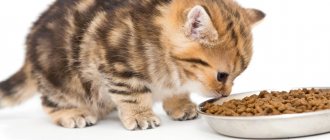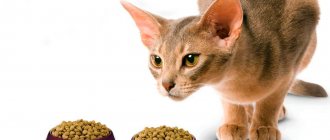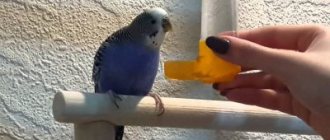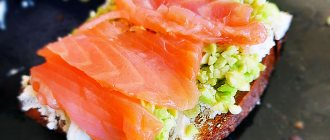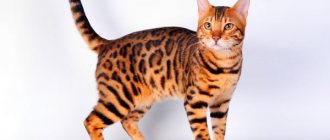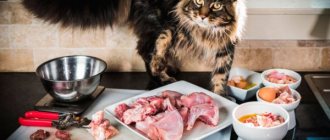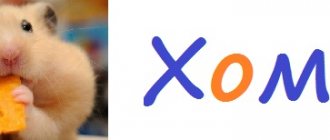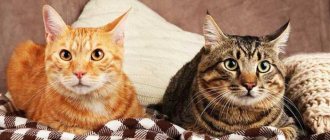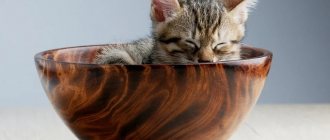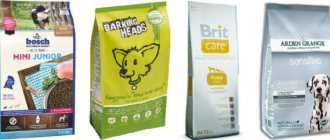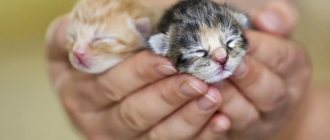When cats begin mating season, they begin to behave horribly. Shit everywhere, yell, and show aggression towards the owners. To avoid this, it is necessary to castrate your pet. Few cat owners are informed that after castration it is necessary to completely change the pet’s daily “menu”. In this material we will tell you about how a pet should eat and how not to harm its health.
Features of the diet of castrated cats
Content
In cats, after castration, active hormonal changes occur. They also show up in their behavior. The animal loses interest in games, becomes lazy and mostly sleeps. A cat's main joy is eating.
After castration, mustachioed pets can show an incredible appetite; in a day they are able to eat three days' worth of food. If they are allowed to eat too much, they may become overweight. It, in turn, can provoke a number of problems - diabetes, urolithiasis and obesity.
In order to avoid these problems, you should adjust its daily “menu”.
Selection of dry and wet food
There are enough industrial dry and wet mixtures in pet stores to make a choice. Which of these can be fed to cats after castration is up to the owner to decide, but first you can take a closer look at the most popular products.
Royal Canin Neutered Adult Maintenance
This is a wet food from a well-known manufacturer, intended for sterilized animals up to 7 years old. The composition has a reduced carbohydrate content, which helps control weight.
Pro Plan Sterilized
Balanced dry food that fully meets the needs of your furry friend. It promotes urinary system health and maintains optimal weight. The granules are enriched with antioxidants, arginine and healthy fatty acids, which are vital for the domestic cat.
Brit Premium Sterilized
Dry granules intended for castrated and sterilized individuals. The products come in many flavors and contain prebiotics, brewer's yeast and fish oil. The presence of fruit extracts and medicinal herbs has a beneficial effect on the digestion and appearance of your pet.
Royal Canin Skin & Coat Formula
A product that can be given to cats with sensitive skin and coat problems. Contains B vitamins and histidine. This complex has a positive effect on the appearance and functioning of the digestive system of the domestic mustache.
CAT CHOW Sterilized
The line includes many flavors that will appeal to any picky eater. It contains a lot of protein, but the amount of carbohydrates is reduced - to prevent obesity. The products contain extracts of medicinal herbs and vegetables, minerals, vitamins and antioxidants.
How to properly feed a neutered cat?
- What kind of food a cat should eat should first be clarified by doctors. Once the food has been selected, it is necessary to accustom the cat to this food several weeks before castration.
- When purchasing ready-made food, it is necessary that the packaging bear the inscription “for sterilized cats.”
- It is necessary to choose food carefully. It is recommended to buy these products only from quality manufacturers.
- It is necessary to ensure that the selected products do not contain phosphorus and magnesium.
- Give your pet fasting days twice a month.
- Make sure your cat has constant access to clean water.
What to do if your cat keeps asking for food?
Does your cat ask for food all the time? Nothing wrong with that. A touching look is not a reason to feel sorry and feed. Today he begs for a tasty treat, and tomorrow he dies of a heart attack - imagine this picture every time you see his eyes full of tears. And remember: the cat, if it has not been overfed, will ask for food - this is a kind of hunt. Be philosophical about constant pleas for another piece of meat or cheese.
To make the neuter less interested in food, play with him more, pay attention, caress him, go for walks, and communicate. Hosts often confuse requests for food with the need to receive attention. And cats can also confuse these two states, because food provides great entertainment, plus the owner usually caresses the pet during feeding. Accordingly, by receiving food, the cat receives attention and is entertained. Over time, food begins to be associated with these pleasant states. There is no need to form such an association: if a cat unexpectedly approaches the refrigerator and starts yelling, offer him a game or affection. Perhaps this will be enough for the pet to stop asking for food.
If the cat has an insatiable appetite and no distractions help, we recommend that you be examined by a veterinarian, because... this sign may be a symptom of pathology.
Rate and share!
What should you not give to cats?
Neutered cats should not eat:
- Pasta;
- Lamb;
- Pork;
- Potato;
- Sausages;
- Tomatoes;
- Salted vegetables;
- Sweet;
- Semolina porridge;
- Canned meat and fish;
- Cheap food for healthy cats.
Most veterinarians prohibit giving your cat fish. The fact is that fish contains a huge concentration of phosphorus. Phosphorus negatively affects the pet's health and can develop urolithiasis.
Prohibited Products
There are a number of products that can cause serious damage to the health of a pet after castration. First of all, no cat in the world is suitable for food from the human table. The presence of salt, seasonings, and other additives is strictly contraindicated for animals.
In addition, some heat treatment methods are also prohibited for feeding a cat. These are, of course, fried foods containing a large amount of fat.
Also, you should not feed a neutered cat the following foods:
- fatty varieties or parts of meat;
- fish of any kind;
- sweets, confectionery;
- any sausages;
- smoked products;
- bread, pasta;
- legumes, corn;
- soy products;
- pickles, pickled vegetables.
Cereals can be given to cats in small quantities, in the form of porridge. The exception is semolina.
It is unacceptable to choose unsuitable industrial food, for example, feeding a neutered cat products that are not intended for him. It is necessary to choose premium brands. Only high-quality nutrition can provide the animal’s body with all the necessary elements and substances.
Prohibited Products
Experts have different views on milk. Almost half of domestic cats are lactose intolerant. If a castrated cat does not have this problem and laps up milk with pleasure, then there is no strict prohibition on consuming the whole product. However, milk contains a lot of calcium, and the intake of this element after castration should be limited.
Choosing ready-made food for a neutered pet
For cat owners, the most convenient type of food is industrial food. The convenience is that you don’t have to manually cook for your cat every day. When using dry food, it is easiest to monitor the required balance of ingredients.
The composition of the feed is important; the following features must be taken into account:
- Dry granules must contain a high concentration of protein (from 50 percent);
- The feed should not contain an excess of carbohydrates, and should also contain a minimum amount of vegetable fat;
- Large amounts of phosphorus, magnesium and calcium should not be allowed;
- Mineral mixtures should not exceed 7%.
Feeding with natural products
Just as dry food makes life easier, feeding with natural products is considered healthier and more correct. But such nutrition entails the hassle of choosing products that will not harm the castrated animal.
What and how to choose for a cat after castration:
- Both meat and fish should not be fatty.
- Sea fish is not suitable due to the high salt content; you need to choose only river fish.
- Low-fat fermented milk products at least twice a week.
- Add boiled porridge to meat products.
- Buy or grow grass for cats.
Under no circumstances should an animal be fed foods that all households eat. Sausages and other semi-finished products of the modern food industry can greatly harm the health of a castrated animal.
Before castrating a cat, you need to understand all the difficulties of caring for and feeding the animal after the operation. You need to weigh the pros and cons, and only then make a decision to neuter or not your pet.
The best industrial feeds
To understand which commercial food is best for your pet, you need to take into account the component content of the product.
Brands that are ideal for the diet of neutered cats:
- Now natural, Go!, Acana. These foods contain substances beneficial to the cat's health, including vitamins and medicinal plant extracts.
- It is also important that the food contains as little harmful fat as possible. BOZITA SUPER PREMIUM fits this description perfectly. Products of this brand contain beef and chicken. In addition, this food contains many useful chemical elements necessary for the health of the pet.
- Superpet raw food. This food contains only natural products and vegetables.
What kind of food should a cat have in the first postoperative days?
All food should be familiar to the pet, and it should be given in semi-liquid form so as not to burden the gastrointestinal tract. In this case, regular portions should be halved.
Is it possible to feed a neutered cat fatty foods these days? No way! Products such as sour cream, fatty fish or meat should be excluded from the diet.
How to feed your cat natural food
To give natural food to your pet, you need to know which products to choose.
For example:
- The meat should be well boiled before serving to your pet.
- By-products must be mixed with the porridge after boiling.
- Vegetables are very healthy for cats. They should be grated on a fine grater and added to the porridge.
- A couple of times a week you can give your pet a raw chicken or quail egg.
You cannot add spices, salt or sugar to the food.
What should be the diet?
The main task is not to overfeed your pet.
Therefore, it is necessary to adhere to the following rules:
- You need to feed the cat 3-4 times a day, but at the same time follow the daily norm. After eating, the bowl of food should be removed from his sight. This regime allows the cat to have time to burn calories between meals and, therefore, not gain excess weight.
- Train your cat to eat at the same time every day. This regimen promotes proper digestion.
- It is necessary to follow the dosage indicated on the food packaging, taking into account the cat’s weight.
- When choosing food, preference should be given to one that contains chicken or turkey, as well as fiber.
- Food should not be cold. It is best to feed your cat warm (but not hot!) food.
- Don't forget about water! Your pet's water bowl should always be full and in an easily accessible place. Optimally - next to the food bowl.
Pet owners often ask, is it possible to feed neutered cats fish? In general, this is not recommended. Since phosphorus contained in fish can provoke the development of urolithiasis. But if your cat is a big fan, then a couple of times a month you can pamper him with a small piece of fish.
Unfortunately, this does not apply to British breed cats.
- Fish and seafood should be categorically excluded from the diet of castrated British people.
- Like any products with a high content of magnesium, calcium and phosphorus.
- This breed is especially susceptible to developing stones in the urinary tract and kidneys.
- And these minerals precisely contribute to this process.
- Therefore, the question of what to feed a neutered British cat is very important.
- For cats of this breed, the optimal feeding regimen is one to two meals a day.
It is important not to overfeed because neutered Britons are much less active than other breeds and therefore burn fewer calories.
That is why you should not treat your pet with various “goodies” such as baked goods or sweets. You should not experiment with feed. Your Brit should eat the same selected food.
Owners of neutered cats should remember that strict nutritional rules must be adhered to throughout the life of their pets. Only in this case will it be possible to protect them from serious diseases and ensure a long and healthy life.
How to prevent the negative consequences of castration
After your pet has undergone surgery, he becomes vulnerable to kidney and genitourinary diseases. Also at risk is such a nuisance as obesity.
To keep your pet healthy, you must follow these rules:
- Give him only filtered or boiled water.
- Do not allow elements in the feed that oxidize urine.
- Make sure your pet eats only low-calorie foods.
- Play with the cat often to normalize its activity.
- Don't give him junk food.
A cat after castration is not considered sick or disabled. But unlike non-castrated ones, they require much more care and maintenance. The most important thing in his condition is the correct nutrition system. Surround your pet with care and love, and he will definitely quickly recover from surgery and be a healthy and active cat.
Feeding a cat immediately after castration
It is important to consider not only what to feed, but also to monitor the portion size and frequency of feeding.
First postoperative day
On the first postoperative day, the cat should not be given food. But he must consume water in the amount necessary for him. After anesthesia, the pet experiences extreme thirst, but at first he has no appetite. After a few hours, you can give the fluffy a little low-fat kefir, weak beef or chicken broth.
The next day, the animal is offered its usual food, but better - pureed. You shouldn’t change your pet’s diet right away to avoid it experiencing additional stress.
First 3-4 days
For several days after castration, fatty foods should be removed from the fluffy's menu. So, delicious sour cream, fatty pieces of meat or fish are still prohibited. During this period, it is necessary to increase the amount of protein in the feed. Chicken or turkey fillets are best suited for this. If your cat eats store-bought food, it is better to buy him a dietary pate during rehabilitation.
Gradually it will be possible to transfer your pet to a new diet. If you do this right away, the cat may experience stress. Problems with the gastrointestinal tract due to the sudden introduction of new foods are also common.
Period after recovery
A pet that has fully recovered from surgery is accustomed not only to other foods, but also to a certain feeding regimen. He will begin to beg for tasty morsels more often and sit at the bowl waiting for more. Many owners follow the lead of the glutton and begin to feed him more and more often. But it's not right.
Neutered animals, due to their hormonal background, gain weight faster. A well-fed pet is most often affected by life-threatening pathologies such as diabetes and disorders of the cardiovascular system.
The nutrition of the mustache after surgery should not exceed the volumes that were before surgery. If your animal is constantly hungry, you should contact your veterinarian and review its diet.
Preventing complications with nutrition
Fight obesity
Most pets stop being active after surgery, spend a lot of time lying down, and constantly strive to beg the owner for a treat, so obesity is one of the most common problems. If the owner takes all the required preventative measures, it will be possible to significantly increase the life expectancy of the animal. First of all, it is important to remember that the cat is fed small portions at least 4 times a day. You shouldn’t follow pets’ lead, even in a situation where they try to beg for food. Twice a month, veterinarians recommend holding a fasting day for cats.
Urolithiasis disease
To prevent stones from appearing in the kidneys or bladder, the owner will need to exclude from the pet’s diet foods rich in calcium, magnesium and phosphorus, which provoke the formation of stones. After surgery, the pet's urethra narrows, so even sand and small stones cannot leave the body naturally. In order to prevent urolithiasis, drinking plenty of fluids will also help. The ratio of food and water is 1 to 3. For 10 g of food, the cat should drink at least 30 ml of water.
The most popular and recommended cat food brands
Sterilization radically changes the life of a pet and its habits. If earlier your cat urgently demanded a walk and was looking for a cat, now he is only interested in food. A cat that eats excessively high-calorie foods will begin to gain weight, and this is already a bad sign for the animal. To keep his figure normal, choose the right food!
The range of cat products includes two main types of food: dry and wet. They differ in composition and cost. If the owner chooses the first option, it is necessary to provide the animal with constant access to drinking water.
Which food is better, dry or wet, is up to you to decide; there is no clear answer to this question. The main thing is to choose a fresh composition of proven quality with mandatory certification, giving preference to reliable brands. Experts do not recommend choosing budget food. Such savings can negatively affect the health of the animal.
Premium class food
Experienced breeders recommend giving preference to the following brands:
- Hills – a large assortment of therapeutic and prophylactic products that help prevent obesity in animals;
- Royal Canin - nutritional composition rich in vitamins;
- Purina PRO PLAN is a balanced food with pribiotics that improve intestinal function.
Special food or natural products?
Immediately after castration, the cat owner is faced with the question of choosing a feeding method. For example, if you have enough free time and the desire to cook, you can choose a natural diet.
It should be noted right away that natural feeding and food from the table are not the same thing.
Pros and cons of a natural diet
The advantages of natural food include the following:
- The diet can be tailored to the individual needs of the pet.
- The animal does not suffer from lack of water.
- Eating natural products, including raw meat, best suits the physiology of cats.
In addition to the positive aspects, natural food also has disadvantages:
- A significant amount of time is spent on preparation.
- Unappealing taste. This problem is most often encountered by animal owners who have previously used industrial feed with flavoring additives.
- High cost of products.
Advantages and disadvantages of industrial feeds
Commercially prepared dry rations are a popular feeding method.
Among their advantages, it should be noted:
- Convenience. It is enough to simply pour in the daily portion of food and ensure the availability of drinking water.
- Attractive to cats. The food contains special flavoring and aromatic additives that animals really like.
- Balanced vitamin and mineral composition.
The disadvantages include the following:
- Dry food is not suitable for cats who drink little.
- High probability of purchasing a fake.
- Allergic reactions.
Be sure to read:
Why do you need special food for sterilized cats?
How to avoid obesity?
Most neutered cats suffer from obesity.
The following factors contribute to its development:
- Sedentary lifestyle. The pet spends most of its time in an apartment in limited space. At the same time, the owner believes that the adult animal has long lost interest in active games.
- High calorie diet. Feeding without compliance with standards, leading to overfeeding, and food from the table.
- Unbalanced diet. Vitamin and mineral deficiency lead to metabolic disorders.
- Hormonal disbalance. It can also cause excess weight.
- Breed predisposition. Due to genetic characteristics, some breeds are prone to obesity. For example, Persian or British.
You can determine if your pet is obese by the following signs:
- Saggy belly.
- Complete absence of a “waist”.
- The chest and spine are almost not palpable.
If you suspect your pet is obese, you should show it to a veterinarian as soon as possible. Only a specialist will be able to correctly assess the animal’s motor activity and, based on this, calculate the amount of feed.
Prevention of the development of obesity after castration comes down mainly to strict calculation of feeding portions and stimulation of the animal’s activity. For example, you can purchase a special play complex or take your pet for walks.
Be sure to read:
Can cats eat fish: how much can you give, what are the benefits and harms, what is not allowed, combination with food
